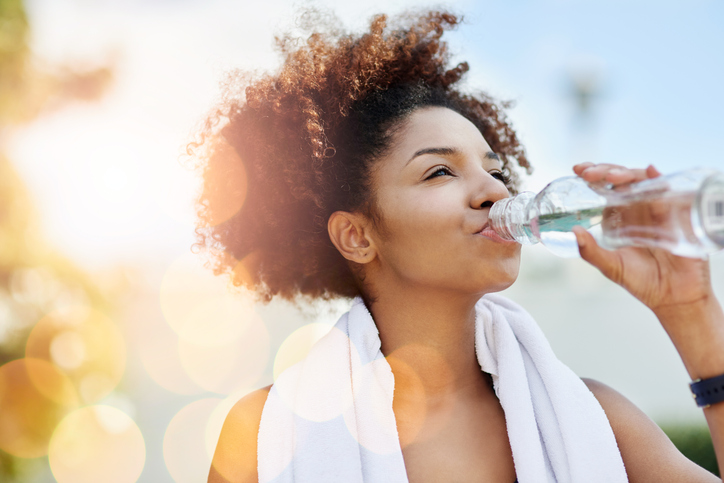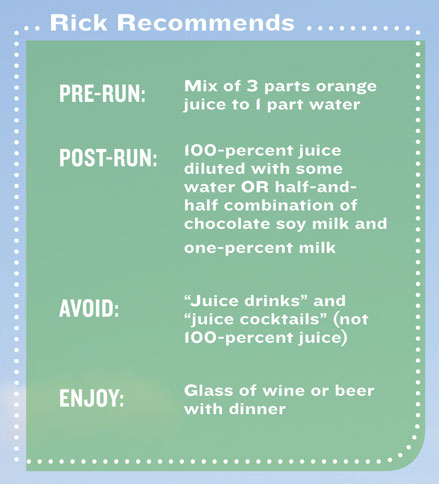Proper hydration is a key to running and racing success; it’s also a key to good health. Thorough hydration is critically important for the body: it lubricates the muscles, organs, spine and joints; it keeps blood from becoming too thick, which can impair physical performance; it’s essential to the health of the kidneys, liver and intestines, because it helps to flush out toxins; and it aids in digestion.
The key time for thorough hydration is before your race or training run, not during. Equally important is complete hydration after your workout. However, many runners worry excessively about hydration during the run, inconveniently carrying water containers in their hands or on belts, stashing water along the route and stopping unnecessarily during their runs or races.
Why is hydration during the run not the best policy?
• Carrying water can affect your running form if you hold something in your hands. It also gets away from the freedom and relaxation of running.
• It adds unnecessary weight, whether in your hands or on your waist.
• Blood and oxygen should be going to the muscles for its intense activity, not detoured to the stomach to aid in absorption and digestion.
• Hydrating while running can cause stomach upset, with sloshing liquids in the stomach, intestinal discomfort, side stitches/cramps or even nausea, especially with more concentrated sports drinks.
• Stopping for water during races slows your time.
Everyone should thoroughly hydrate at least twice a day, before a run or workout, then afterwards, saturating the body with liquid. How much fluid you need depends on the season and outdoor temperature, but in general 16 to 32 ounces of fluids, or two to three glasses, before your run is appropriate. A good sign that you’re well hydrated is if your urine is totally clear after your pre-workout hydration and before your activity. After the workout, thoroughly quench your thirst. This should also take about two to three glasses of fluid.
I find plain water boring and couldn’t adequately hydrate if water was my main liquid source. I prefer a mix of orange juice and water (3 parts O.J. to 1 part water) before my run and various 100-percent fruit juices after the run (also often diluted with some water). The natural sugars in fruit juices provide quick energy for the workout or race. (One drawback to drinking fruit juice is that it may lead to cavities, so it’s important to thoroughly rinse your mouth out with water and/or brush your teeth after drinking juice.)
A good post-workout beverage, which has become increasingly popular with sports nutritionists, is chocolate milk, with its ideal combination of protein, carbs and other nutrients, hastening quick muscle recovery. My personal preference here is a 50-50 mix of chocolate soy milk and one-percent low-fat milk.
I avoid all juice “drinks” and juice “cocktails,” as well as all sports drinks, since they usually have various combinations of artificial colors, flavors and sweeteners, and typically contain high-fructose corn syrup and other added sugars.
Some of the above ideas are unconventional, especially not drinking during races, but my system has worked for over 45 years of running and racing. I never hydrate during a race, even in half marathons like the Virginia Beach Rock ‘n’ Roll Half held during the heat of Labor Day Weekend.
While these hydration procedures work for me, they may not work for everyone, especially if it’s excessively hot or humid outside and/or you sweat profusely during exercise. The key for everyone, though, is complete hydration before the run; then use the body’s thirst signals as a key during exercise. If you’re just mildly thirsty, your stomach will appreciate you waiting until the run is over to rehydrate. But if you’re really thirsty, don’t deny your body fluids, especially if you’re running long (half-marathon or greater) distances in high temperatures.
Finally, any changes in your hydration routine should be gradual, since it’s best to allow the body to acclimate slowly to the heat, and to get used to not drinking during exercise.



